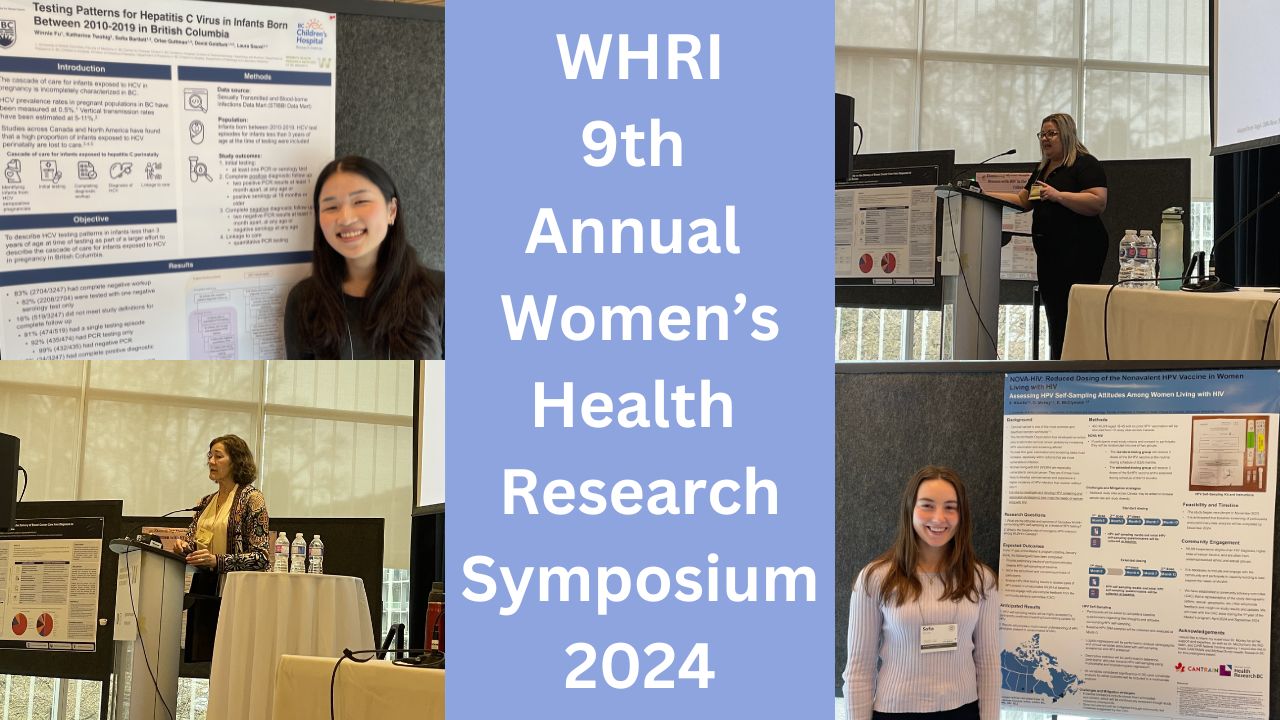
This past Friday, March 8th, which coincided with International Women’s Day, the RID team attended the WHRI’s 9th Annual Research Symposium at the Robert H. Lee Alumni Centre on UBC Vancouver’s Point Grey Campus. This fascinating event included a variety of speakers, with a central focus of the presentations on the symposium’s theme of “Midlife Women’s Health Research: Unpacking the Science of the Menopausal Journey and its Health Impacts”.
Numerous very interesting presentations were conducted, with one of the most notable being the Keynote Address by Dr. Susan D. Reed, MD, MPH, MS, (bottom left in image) who is a current Professor Emeritus and previous Vice-Chair for Research in Obstetrics and Gynecology at the University of Washington School of Medicine. This address was on the topic of “Why research focused on menopause and its impacts is critical to advancing women’s health.”, which helped to showcase how important greater research on menopause and greater allocations of research funding for this topic could have immeasurable positive impacts on the health and wellbeing of midlife women.
Another notable presentation was done by Spotlight Speaker Dr. Michelle Jacobson, MD, FRCSC, (upper right in image) who is a clinician scientist specializing in menopause oncology, as well as Hereditary Breast and Ovarian Cancer Syndrome. Her presentation “The legacy of the Women’s Health Initiative hormone trial on the provision of menopausal care for women.”, provided so much insight on how the Women’s Health Initiative (WHI) study and the improper dissemination of its results in society and the media, shaped the view of hormonal treatment for menopausal women. It helped to show that proper interpretation of results and description of these findings is so critical in research, to help prevent the perpetuation of dangerous misinformation that can have many negative impacts for the medical care of numerous people. It also helped to show that hormonal treatment is actually a safe and beneficial treatment option for women experiencing difficult symptoms from the menopause transition, and that when conducted correctly, the risk of adverse effects from this treatment is lower than is commonly perceived in societal belief/media.
Other highlights included two RID Program trainees Sofia Nicolls (MSc Candidate, bottom right in image) and Winnie Fu (MD Flex Student, upper left in image) presenting posters during the poster sessions. Sofia presented on the RID Program’s NOVA-HIV study, and Winnie presented on her research work outside of the RID Program with the BC Children’s Hospital Research Institute and BCCDC on the testing patterns for Hepatitis C in BC infants. These were both very well-done and we are very proud of the work of our trainees! Finally, the RID Program’s long-term collaborator Dr. Laura Sauvé (not pictured), presented during one of the “Rapid-Fire Research Panels” on the results (specific to midlife women participants) of the BCC3 (British Columbia CARMA-CHIWOS Collaboration) study, which is a study being conducted on healthy aging in women living with HIV. Overall, the symposium was very informative and incredibly engaging, with so much information and insight being shared. We are very appreciative to the WHRI for hosting such a great event! For more information on the event, you can click here to visit the WHRI webpage for the symposium.